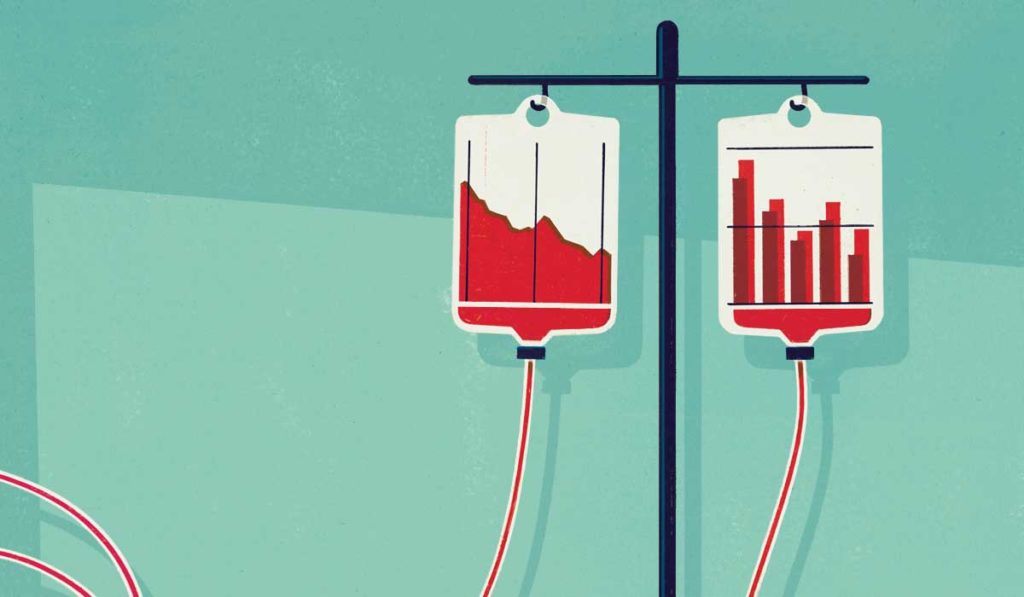Kevin Johnson, M.D., is Cornelius Vanderbilt Professor Chair of Biomedical Informatics and Vanderbilt University Medical Center’s Informatician in Chief. He serves as head of the National Library of Medicine’s Board of Scientific Counselors and is a member of the NIH Council of Councils. Discoveries asked Johnson to discuss his thoughts on the role of health informatics in meeting the evolving needs of patients and providers.
Personalized Medicine and Predictive Analytics
Discoveries: Starting with a big-picture question: where is health analytics headed in the age of personalized, or precision, medicine?
Johnson: Right now, somewhere in the neighborhood of 3 percent of people are receiving a medication that’s either not working for them or is the wrong medication for their disease. If that number is extrapolated to patients on two or more medications, the percentage quickly goes up – to the point that for every patient who takes five drugs, at least one isn’t the ideal drug for them. This creates a tremendous cost for the health care system because diseases may not be being managed appropriately, leading to unnecessary complications, or the patient may develop adverse drug effects from unnecessary medications.
Pharmacogenomics is beginning to address this. But how do we decide to withdraw standard of care for patients who don’t need it? For example, if you’re a patient who has high cholesterol, but – because of the work we can do with predictive analytics – has exceedingly low risk of a heart attack, should we care as much about the fact that your cholesterol is high? The answer is you probably don’t need a statin and you may or may not need a baby aspirin. Based on genetic data or predictive analytics – or even your ZIP code – we are moving beyond a simple conversation about which therapies are appropriate for the average patient to focus on the individual, including their social and behavioral determinants.
Discoveries: As you mentioned, a patient’s health is based on so much more than genetics. What are we doing to capture the other factors?
Johnson: Vanderbilt was one of the first institutions to use PREDICT (Pharmacogenomic Resource for Enhanced Decisions in Care and Treatment) to support genome-informed care. One of the things we’re working on in our Center for Precision Medicine is taking all the data we’ve gathered with PREDICT and expanding it into something we call My PharmacoGenome. In this far-reaching project, all key patient attributes would be captured int the electronic health record (EHR) and then linked to precision medicine-related opportunities.
In the All of Us Research Program, one of the largest research grants Vanderbilt has ever received, we hope to advance precision medicine by collecting data from one million participants and analyzing the intersection between biology, environment and lifestyle. Our Center for Knowledge Management contributes to the All of Us Research Program in several ways, bringing expertise in critical appraisal of the biomedical and grey literature, metadata capture, knowledge organization and health literacy.
Breaking Down Silos in Public Health
Discoveries: Your department’s research has long been involved with public health initiatives. What role does biomedical informatics play in addressing public health challenges?
Johnson: When we talk about precision medicine, we try to think about the use cases that go beyond managing disease. What about the unique needs of underserved populations? For example:
- Many families are food and shelter insecure; how do we uncover the patient’s exposome and modify health risks?
- Homeless patients have special medication needs, e.g., they should not get medications that require refrigeration. How do we discover this and prescribe more appropriately?
- LGBTQ patients, especially transgender people, have different screening requirements than patients who aren’t. This requires that people be willing to disclose their status, but also requires that we have an evidence-based, personalized guideline for these patients.
We recently formed a new Center for Improving the Public’s Health Using Informatics. The center, a collaboration between the Departments of Biomedical Informatics and Health Policy, will focus on bridging the gap between public health and health care to mutually develop and test critical informatics capacity for improving population health. In addition to health care data, the center will evaluate geographical and environmental markers and use the social determinants of health to help create a picture of total health.
Changing Data Systems, Changing Health Systems
Discoveries: Vanderbilt’s Biomedical Informatics Department developed one of the first electronic health records. How has patient data capture changed in 25 years and where does it go from here?
Johnson: There has to be a partnership between patients, providers and data – that’s the world we live in. We had a highly evolved EHR, but we had no way to disseminate the work we were doing because no one else was using the same system. So, we just went through a multi-million-dollar transformation from a home-grown EHR to Epic.
One of our new challenges is that we need to work with our colleagues at Epic to make it better; we have to lead the charge and make the EHR as good as the one we had before. The first change we’ve implemented is connecting Epic to our REDCap (Research Data Capture) system. We have disseminated the code; we think this will allow the country to reinvent post-marketing surveillance for medications, as one example. Providers can open a REDCap survey and answer questions about drugs they’re prescribing.
Discoveries: What else do you see in the future of biomedical informatics?
Johnson: In my research, I am looking at ways to transform health care systems to support data science. This is a relatively new concept – modify form to address function. We have a study that demonstrates that we can predict which patients are at increased risk for suicide. A lay person might say, ‘Wow, you can predict suicide?’ when the real question is, ‘What are you going to do about it?’ Do you admit every patient who’s at risk for suicide? Obviously not. Do you tell them? They might already know.
“A lay person might say, ‘Wow, you can predict suicide?’ when the real question is, ‘What are you going to do about it?’”
It’s essentially a new way to think about medicine. What is the design we’re going to put in place that is reasonable, that is not too aggressive? Do we have a workforce whose entire job is to manage predictions? Do we create new dashboards for our social workers so they can determine the stressors that may be causing increased risk? Or do we look around for other support systems – like churches – with whom we’re flagging patients as increased risks?
Every prediction we might invoke is essentially a screening test. We all understand that we do not screen for a disease if we cannot modify either its likelihood of occurring or improve the patient’s ability to cope with it. Predictive analytics is no exception. If we have a prediction we want to share, what would its intervention look like? In a day in the life of the patient, what do they experience, and which, if any, care providers are part of that process? What I’ve been proposing is that we start using methodologies like design thinking to explore ways we can improve health care using prediction.
Discoveries: Dr. Johnson, thanks for speaking with us today.
Johnson: Thank you.





